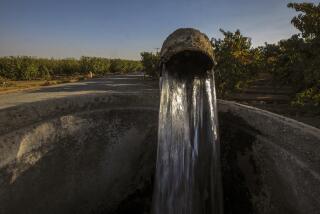Californians, start conserving
- Share via
Abill that would require Californians to cut per-capita water use 20% by 2020 quietly passed in the Assembly last week, by a vote of 48 to 30. Though it didn’t get much attention, AB 2175 was the first serious effort to impose a statewide target for water conservation in California -- a major shift for a state where water management is fragmented and historically has been based on a blind and false faith that cities and farms will always be able to get more water when they need it.
Like its spiritual cousin, AB 32, which set statewide goals for greenhouse-gas emissions, AB 2175 represents a groundbreaking and positive step for California. But also like AB 32, its success -- in the Senate and beyond -- depends on how legislators, the governor, cities and agricultural users work out its implementation.
Proposals for amendments to the bill, which is expected to have its hearing in a Senate committee this month, abound. Cities that already have successful conservation programs in place worry about establishing a baseline for future cuts. Will they receive credit for the work they’ve already done? How will the state measure progress in places like Sacramento that still don’t have water meters? Should districts with many industrial and commercial users -- which use more water than homes -- get special consideration? How about cities with many multifamily dwellings, which use less?
Obviously, the Senate should consider these concerns and work to write a bill that treats everyone as fairly as possible. It should not, however, cave in to the decades-old rules of the water game, which hold that all players do anything it takes to exploit the system for their own advantage. If saving water weren’t painful, California would have done it a long time ago. All of us must shoulder this burden.
That means farmers too. AB 2175 already sets a less-stringent standard for agricultural users, some of whom are notorious water guzzlers, than it does for cities. Agricultural interests may push to be removed from the bill altogether, citing the instability they’ve suffered as the state has cut water exports from the Sacramento-San Joaquin River Delta.
Thus far, Gov. Arnold Schwarzenegger has pulled off a neat trick: He has managed to promote conservation and placate agricultural districts, which are a key part of his Republican base, at the same time. The governor earlier this year called for a 20% per-capita water-use reduction, but only in urban areas. He has not yet taken an official position on AB 2175.
We understand that reducing water use could hurt farmers. It almost certainly will hurt residents and businesses throughout California. Tough. We call on the Senate to pass a conservation bill that engages the entire state, including agricultural users, in a serious way. And this time, the governor must lead the call for everyone to make sacrifices.
More to Read
A cure for the common opinion
Get thought-provoking perspectives with our weekly newsletter.
You may occasionally receive promotional content from the Los Angeles Times.









